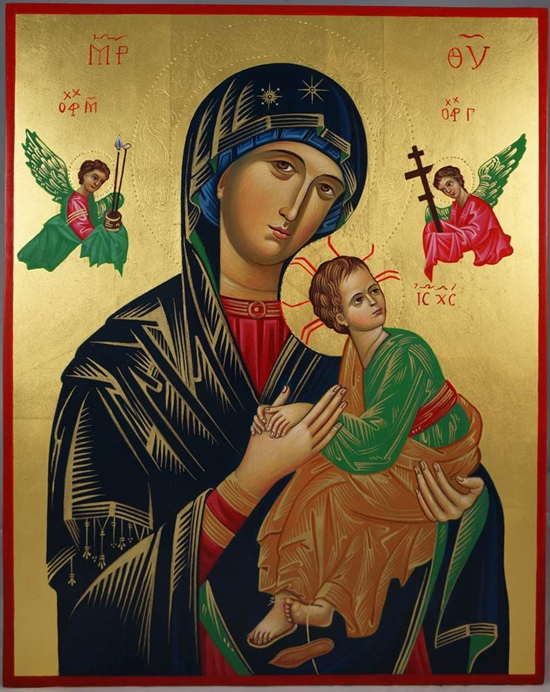Becoming the God-Bearer
Solemnity of Mary Scripture Readings

Today is the Solemnity of Mary, Mother of God, as well as the commemoration of Jesus’s circumcision into the people of Israel, becoming heir to God’s promises through the Law of Moses, the Torah. Our reflections this morning need to begin with that critical phrase, “Mother of God,” in Greek, Θεοτοκος (Theotokos), the God-Bearer. The third Ecumenical Council of the Christian Church, the Council of Ephesus, in 431 AD, defined for good and all that Mary was certainly Θεοτοκος (Theotokos), although the Fathers of the Christian Church had already been using the term regularly for two centuries—at least since the time of Origen. The term Θεοτοκος (Theotokos) or “Mother of God” is actually telling us more about Jesus than it is about his mother, Mary. In reply to those who suggested that Jesus was only human, or had been adopted by Father God, or had become divine at the resurrection, the Church used this term to make clear that the divine Word took flesh in the Virgin Mary and was born—God in human essence. Accepting that Mary was the Mother of God puts to rest any further controversy over the nature of her son, Jesus.
Last weekend, I commented on Mary and how she “kept all these things, reflecting on them in her heart.” This gives us a further insight into Mary’s character and personality. It seems that she was a contemplative. She didn’t fully comprehend the depth and breadth of the angel’s message to her at the Annunciation, although she gave her assent to it, nonetheless. Neither did she fully understand the events described in the gospel today surrounding the birth of her son. In fact, she didn’t fully understand the nature of her mission at least until the ministry, suffering, death, and resurrection of her son and the coming of the Holy Spirit upon her at Pentecost. She, more than any other person, was witness to the entirety of the Incarnation from the first moment until her last. Over that period of time, her understanding and appreciation of the mission of her son and her role in it deepened. She, too, along with the Twelve, received the gift of the Holy Spirit and witnessed the emergence of the resurrected body of her son in the Spirit-infused disciples. She witnessed the fulfillment of the Incarnation in the birth of the Church, and therefore she realized the fulfillment of her own mission as the mother of Jesus, as the Θεοτοκος (Theotokos)—Mother of God—and as the Mother of the Body of Christ, the Church.
Once we have gained an insight into the reality that underlies our gospel text, we can now turn our attention to that ever-more-compelling question, namely, “What does this have to do with me?” To answer this, we need to revisit those glib statements we’ve heard since childhood. We’ve been told that Mary is our mother. We’ve been shown how, on the cross, Jesus gave Mary to John, the Beloved Disciple, as his mother and that John represents all of us. But the reality is deeper than that. In Baptism, we died with Christ and were raised up with him to live a new life. We’ve been gifted with the Holy Spirit so that we can say with Saint Paul, “It is no longer I who live, but Christ who lives in me.” [Galatians 2:20] We’ve “received the Spirit of Adoption as sons and daughters by which we cry out, ‘Abba! Father.’” [Romans 8:15] We’ve been, as it were, grafted onto the Body of Christ as members of his Church. Therefore, the Mother of God is our mother, too, because the eternal life we have received, we received through her instrumentality.
That’s not all. We can ponder these things in our hearts as well, as Mary did, because, just as the Christ became incarnate in the world through Mary’s ministry of obedience, now, it’s our turn. It’s our selfless obedience to Christ’s law of unconditional love that continues to give flesh to the Incarnate Word in our world. Mary, the Θεοτοκος (Theotokos), the God-Bearer is our model because each of us, as a member of the Mystical Body of Christ, is likewise called to be a God-Bearer into our world. So, in a special way today we can pray, “Mary, Mother of God and Mother of the Church, pray for us, that we might become, as you always were, Θεοτοκος (Theotokos).”
Get articles from H. Les Brown delivered to your email inbox.
